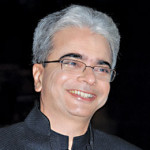The field of cardiology has undergone rapid changes in the last decade. We have more potent drugs, development of new diagnostic techniques, and evolution of stent technology with more complex coronary anatomy being treated without surgery. New valve therapies for high risk patients have emerged and are likely to evolve further. Stem cells as always have been an area of active debate and research. It can be said that the future looks bright and there is much to look forward to.
Recently, there is approval and availability of new antiplatelet drug Prasugel/Ticagrelor used in the treatment of unstable patients and also for those undergoing stent procedures. New drugs like Ivabradine and Ranolazine are being used as add on therapy for angina management. For treatment of irregular heartbeats like atrial fibrillation drug like Dronedarone, which is a new antiarrythmic drug is being used, while Dabigatran an oral anticoagulant is a very exciting addition in stroke and embolism prevention in patients with atrial fibrillation. The latest addition for cholesterol management is a drug called Rosuvastatin, which has shown promising results. Newer drugs which are stronger are undergoing advanced stage clinical trials.

In interventional cardiology, various newer modalities for assessment and treatment of the severity of the lesion during angiography have been developed. Procedures like Fractional Flow Reserve, which are used to measure pressure differences across coronary artery block to determine the likelihood that it impedes oxygen delivery to the heart muscle. Another technique which is gaining importance is IVUS assisted angioplasty (Intravascular Ultrasound). IVUS guidance may provide with the opportunity to optimize results during the angioplasty procedure and help more accurately select the cases where stenting are required.
Newer local drug delivery using Drug Eluting Balloon (DEB) have generated interest lately. DEB is used in patients where Drug Eluting Stent (DES) cannot be delivered or where DES does not perform well. With the advance in technology lately, bioabsorbable stents have been developed because the need for mechanical support for the healing artery is temporary. The advantage of complete biodegradable stent is that the stent would disappear from the treated site reducing or abolishing late stent clotting, improving lesion imaging with CT or MR, facilitation of repeat treatments (surgical or percutaneous) to the same site.
Till now management of valvular heart disease was mostly surgical domain, among the valve afflictions valvular mitral regurgitation remains largely the purview of surgery. The Mitra Clip Device, a metallic clip is used to grasp and approximate the free edges of the two leaflets, has proven relatively safe and effective. Various other devices have been used for the treatment of cardiac conditions like an implantable cardioverter defibrillator or automated implantable cardioverter defibrillator for the treatment of sudden cardiac death due to ventricular fibrillation and ventricular tachycardia. Another device used to treat patients with advanced congestive heart failure is a ventricular assist device, which is an electro mechanical circulatory device that is used to partially or completely replace the function of the failing heart.

Percutaneous aortic valve replacement using stent based prosthesis has emerged as a promising new option in which surgical aortic valve replacement is considered not to be safe.
Lastly, stem cell therapy as applied to cardiology has shown partial progress. A large number of patients with coronary artery disease experience angina with vessels that are not suitable for revascularization. The angina in so called end stage coronary artery disease is refractory to conventional medical therapy. Stem cell therapy may be the answer to problem of left ventricular function recovery following an angioplasty during an ongoing heart attack but needs to be proved conclusively in large scale trials.
future holds bright for cardiac patients with the advance in technology and medicine improving the overall morbidity and mortality along with improvement in the quality of life.
Be a part of Elets Collaborative Initiatives. Join Us for Upcoming Events and explore business opportunities. Like us on Facebook , connect with us on LinkedIn and follow us on Twitter , Instagram.













